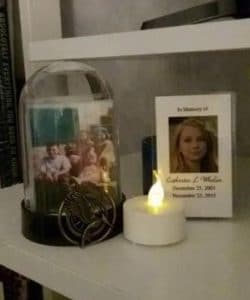By Caroline Connick | Staff Writer
As National Suicide Prevention Awareness Month comes to a close, I’ve had a lot of time to reflect on the issue of suicide. According to the American Foundation for Suicide Prevention, about 117 people end their own lives each day, and it typically happens when people with mental health conditions are under more stress than they can deal with. I alone have become a suicide loss survivor three times in my life.
Friday, September 23, 2016 marked ten months since my third suicide loss. My godmother found her youngest daughter Catherine dead by her own hand after only 13 years on Earth. Catherine, along with her older sister Kelsey and older brother Will, were cherished childhood friends of mine. They were the closest things I’ve ever had to siblings, as our parents were each other’s godparents, and we shared many family vacations growing up. I still remember visiting Cat after her birth before she even left the hospital.
 At the wake, I stood in the line of mourners that stretched around the entire funeral home, feeling like I was going to have a heart attack. It was an open-casket wake, and I didn’t know what to expect to see when I finally got into the room where Catherine was. It finally became real for me when I saw her body. She had grown into such a beautiful girl, but she was gone. Propped up inside the open cover of the casket was a ceramic treble clef, a handmade card, and a “Keep Calm, I’m the Doctor” refrigerator magnet. Today I keep a matching car magnet on my Jeep in her memory, as our admiration for the television show “Doctor Who” was one of several things that we had in common. The casket was surrounded by flower arrangements that filled the room from floor to ceiling. At the foot of the casket was a Christmas tree, placed in homage to her birthday on December 25th that was only about a month away.
At the wake, I stood in the line of mourners that stretched around the entire funeral home, feeling like I was going to have a heart attack. It was an open-casket wake, and I didn’t know what to expect to see when I finally got into the room where Catherine was. It finally became real for me when I saw her body. She had grown into such a beautiful girl, but she was gone. Propped up inside the open cover of the casket was a ceramic treble clef, a handmade card, and a “Keep Calm, I’m the Doctor” refrigerator magnet. Today I keep a matching car magnet on my Jeep in her memory, as our admiration for the television show “Doctor Who” was one of several things that we had in common. The casket was surrounded by flower arrangements that filled the room from floor to ceiling. At the foot of the casket was a Christmas tree, placed in homage to her birthday on December 25th that was only about a month away.
When a suicide occurs, people often try to blame themselves, but they shouldn’t. My godparents, for example, had been taking Cat to a therapist for some time before her death. They did exactly what they were supposed to be doing, but I still often find them blaming themselves for their loss. Based on what I’ve heard from my godmother, Catherine displayed some signs of depression, which may have been a major factor in her death.
At Catherine’s wake my godfather told me, “This isn’t the natural order of things. When you see a friend who needs help, just remember that this wasn’t supposed to be this way.” I live by those words every day, and these words can save lives.
If you’re not mentally ill yourself, chances are that you know someone who is. Anyone can benefit from speaking to a therapist. People shouldn’t have to be afraid of getting help, or being judged for this torment that they never asked for. We live in an age where there are so many treatment options readily available for mental illness. They’re so accessible on college campuses such as ours, often for free. People who seek treatment for mental illnesses are doing the responsible thing for themselves and everyone who cares about them.
If you or someone you know is seeking treatment for mental illness or even just stress commonly associated with college life, please contact Counseling Services. They can be reached by phone at (401) 341-2919 and by email at counselingservices@salve.edu. In the event of a mental health emergency, such as a severe panic attack, anxiety attack, or a suspected imminent suicide attempt, the Counseling Services webpage advises students to contact the Office of Safety and Security at (401) 341-2325 or call 911.













